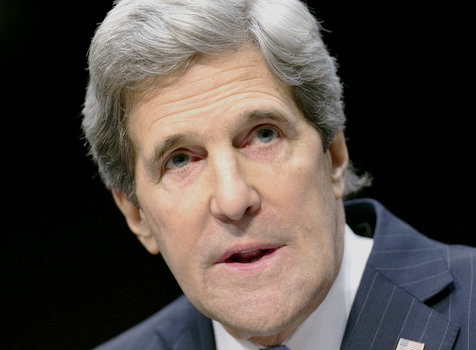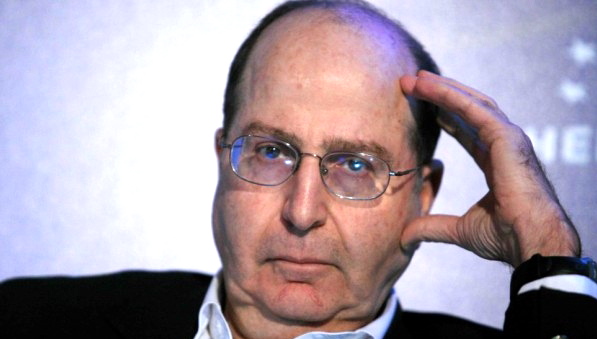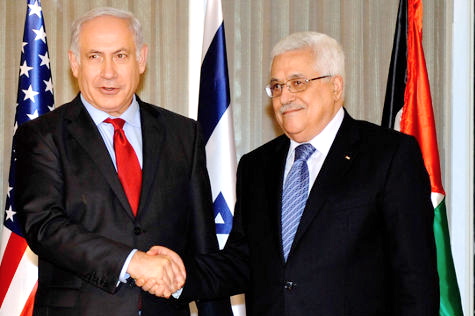In the face of deep skepticism from both sides, U.S. Secretary of State John Kerry claims that Israel and the Palestinian Authority have made considerable headway since the resumption of bilateral peace talks five months ago.
“I believe we are closer than we have been in years to bringing the peace and prosperity that all the people in this region yearn for,” he said earlier this month, following his ninth visit to the Middle East since assuming his post last February. “The naysayers are wrong to call peace in this region an impossible goal.”

To Kerry, Israel and the PA are within reach of signing a peace agreement by the spring of 2014. Or so he says.
After a three-year hiatus, Israel and the PA resumed direct negotiations on July 31 under the auspices of the United States, with the goal of reaching a final status accord in nine months. But after 20 sessions, there have been few, if any, signs of tangible progress, prompting expressions of pessimism from Israel and the Palestinians.
In the most obvious manifestation that negotiations have borne no fruit, the chief Palestinian negotiators, Saeb Erekat and Muhammad Shtayyeh, handed in their resignations to PA President Mahmoud Abbas on Oct. 31.
Erekat and Shtayyeh accused Israel of undermining the talks by continuing to expand its network of settlements in West Bank — the supposed site of a future Palestinian state — and chided the United States for not strongly opposing Israel’s settlement construction, which contravenes long-standing U.S. policy, threatens a two-state solution and is widely regarded as a violation of international law.
Senior Palestinian officials were wringing their hands in frustration and exasperation even before Erekat and Shtayyah resigned.
On Sept. 3, Abbas warned Washington that talks were proving pointless and would not yield concrete results without greater U.S. pressure. Meanwhile, one of Abbas’ top advisors, Yasser Abed Rabbo , declared, “These negotiations are futile and won’t lead to any results.”
On Nov. 1, the PA’s ambassador to the United Nations, Riyad Mansour, charged that Israel would rather be an occupier than a partner for peace, claiming that the Israeli government was taking advantage of the talks to consolidate its hold over the West Bank.
On Nov. 16, Abbas’ political advisor, Nimr Hamad, voiced doubts that an agreement was possible with Israel’s right-wing government, headed by Prime Minister Benjamin Netanyahu.
On Nov. 28, Nabil Shaath, a close advisor to Abbas, asserted that peace talks with Israel had already failed, and that the prospect of freeing more Palestinian prisoners in Israeli jails was the sole incentive for keeping the negotiations alive.

Yuval Diskin. the former director of the Shin Bet, Israel’s domestic intelligence agency, has suggested that the Israeli government is tacitly sabotaging the talks in the interests of preserving West Bank settlements.
As he put it on Dec. 3, “It does not seem as if the current government is trying to change the trend regarding the settlement enterprise. Our friends in the world are giving up on the prospect of a two-states-for-two-nations solution.”
Warning that rising Palestinian anger in the West Bank may yet spark a third Palestinian uprising, Diskin said, “The Palestinians feel that their state is being stolen from them.”
Israel’s minister of science and technology, Yaakov Peri, a former Shin Bet director, is also gloomy about the possibility of peace. In mid-November, he predicted that Netanyahu’s coalition would implode if faced with the reality of endorsing a peace agreement that cedes much of the West Bank.
Peri is not the only cabinet minister who has struck a pessimistic note.
Moshe Yaalon, the minister of defence and former chief of staff of the armed forces, claims that Israel has no Palestinian partner. “On the other side, there isn’t and hasn’t been since the dawn of Zionism, a (Palestinian) leadership that’s willing to recognize our right to exist as the nation state of the Jewish people …” he said in a self-serving commentary this month.
Earlier in the year, he pointedly questioned the land-for-peace formula, which enabled Israel to sign peace agreements with Egypt and Jordan in 1979 and 1994, and claimed that Israel needed to retain and strengthen West Bank settlements.

On a visit to Toronto a few years ago, Yaalon revealed his true colors, admitting that Israel was merely “maneuvering,” playing for time, when negotiating peace with the Palestinians.
Israeli Foreign Minister Avigdor Lieberman, who lives in a West Bank outpost, believes that talks are likely to flounder and that Israel can only “manage” the conflict with the Palestinians.
Israel`s minister of housing and construction, Uri Ariel, a leader of the settlement movement, is blunter. Ariel, who recently announced plans to build 20,000 housing units in the West Bank, openly opposes a two-state solution. “The vision of two states is unrealistic and will never happen,” he said last summer, echoing a comment made by Naftali Bennett, the leader of the far-right Jewish Home party, of which Ariel is a member.
Netanyahu, though a hawk by Israeli standards, has been far more circumspect when discussing peace.
“I’ve made hard decisions to further peace negotiations,” he said on Dec. 7, referring to his acceptance of a two-state solution, his policy of reaching a “historic compromise that ends the conflict between us once and for all” and his most recent decision to cancel Ariel’s proposal.
Netanyahu’s government, however, continues to build in the West Bank and refuses to impose a full settlement freeze. According to Israel’s Central Bureau of Statistics, construction in the West Bank rose by nearly 130 percent this year compared to 2012.
According to reports, Israel was scheduled to announce on Dec. 30 that a further 1,400 housing units would be built in West Bank settlements.
Israel’s settlement policies have infuriated the United States, its chief benefactor and ally. In November, before claiming that the current round of peace talks were progressing, Kerry criticized Israel in unusually harsh terms. Calling a permanent Israeli occupation of the West Bank untenable, he said that settlements are incompatible with peace. Warning that a “violent Palestinian leadership” might supplant Abbas, he said that a third intifada would erupt if talks faltered.
“If we do not resolve the issues between Palestinians and Israelis,” he asserted, “there will be an increasing isolation of Israel (and an) increasing campaign of delegitimization of Israel.” And in a somber warning to Israel, he added, “Today’s status quo will not be tomorrow’s or next year’s.”
In pursuit of the holy grail of peace, Kerry, who’s expected to visit Israel in the first week of January, has submitted two overlapping proposals for consideration: a security plan hammered out by Gen. John Allen, the former commander of U.S. forces in Afghanistan, and a more sweeping framework for peace, which touches on pivotal issues like final borders, the fate of Palestinian refugees from the 1948 and 1967 wars and the disposition of eastern Jerusalem, which Israel captured in the Six Day War and then expanded.
To no one’s surprise, Israel and the PA are far apart on key issues.
Netanyahu has said that the PA must accept two primary conditions before he can sign an agreement and thereby risk the integrity and longevity of his coalition government.
As he stated on Dec. 4: “In order for there to be peace between us and our Palestinian neighbors, they must recognize the right of the Jewish people to a state of its own in its homeland. The second foundation is the security that can defend the peace and will defend the Jewish state in case the peace frays.”
Israel’s top two security demands are bound up with its insistence on redrawing the post-1967 borders. Having rebuffed Washington’s suggestion that talks should be based on Israel’s pre-1967 borders and reciprocal land swaps, Israel wants to maintain an armed presence in the Jordan Valley for the foreseeable future and preserve settlement blocs near Jerusalem and Tel Aviv. The U.S. security plan addresses Israel’s demands to some extent, but Israel is reportedly not entirely happy with it.

The Palestinians, so far, refuse to recognize Israel as a Jewish state, having recognized Israel’s existence in the 1993 Oslo accords. Palestinian recognition of Israel as a Jewish state would probably come at a more advanced juncture in the talks, once the PA is convinced that Israel really means business.
The PA, in conjunction with the Arab League, has turned down Israel’s two major security demands, which would impinge on the territorial contiguity of a future Palestinian state. Under the best scenario, a full Israeli withdrawal from the West Bank, a projected Palestinian state would encompass only 22 percent of Palestine, circa 1947. In this respect, territorially speaking, the Palestinians have already compromised, contrary to Israeli claims.
In light of these sharp disagreements, the talks are now at an impasse, Kerry’s boundless optimism notwithstanding.
It goes without saying that Israel is entitled to security and eventual Palestinian recognition of its status as a Jewish state, but its insistence on keeping the bulk of the settlements in the West Bank constitutes a formidable impediment to a peaceful resolution of its century-long dispute with the Palestinians.
As United Nations Secretary General Ban Ki-moon said recently, “Announcements of thousands of new housing units cannot be reconciled with the goal of a two-state solution and risk the collapse of negotiations.”
More to the point, as Diskin has pointed out, the conflict with the Palestinians poses a greater existential danger to Israel than Iran’s nuclear program: “The alternative to the vision of a two-state solution is one state. In a situation like this, the vision of a democratic Jewish state will disappear.”
Ehud Olmert, Netanyahu’s predecessor, has argued that Israel has no alternative but to reach an equitable peace agreement with the Palestinians. But is the recalcitrant Israeli government capable of achieving that objective? It’s doubtful, given the political complexion of the Israeli cabinet. Ehud Barak, who served as defence minister under Netanyahu, once said that this government is incapable of making peace.
A government hell-bent on expanding and retaining settlements, while ostensibly discussing the finer points of a peace agreement, is simply acting in bad faith and playing games. It is not, as Olmert noted, “conducting serious negotiations for peace.”
Need more be said?
